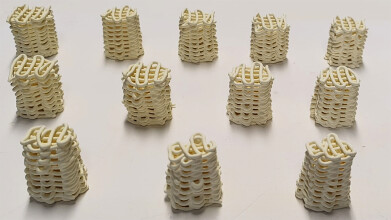Water/Wastewater
Innovative 3D-printed ceramic ink removes harmful 'forever chemicals' from water
Aug 06 2024
Engineers at the University of Bath have developed a groundbreaking method to eliminate health-threatening 'forever chemicals' from water using 3D-printed ceramic lattices. This innovative approach, which targets perfluorooctanoic acid (PFOA) among other perfluoroalkyl and polyfluoroalkyl substances (PFAS), has shown to remove at least 75% of these harmful compounds from water.
Published in the Chemical Engineering Journal, the research highlights a potentially significant tool in the fight against PFAS contamination. PFAS, known for their persistence and resistance to degradation, can take over a thousand years to break down and have been linked to various health issues, including reproductive, developmental, and cardiovascular problems, as well as an increased risk of diabetes.
PFAS are commonly found in household items with water-repellent properties, such as non-stick cookware, raincoats, paints, fabrics, and firefighting foams.
Dr. Liana Zoumpouli, a Research Associate in Bath's Department of Chemical Engineering, explains, "PFAS are a major focus in water treatment and public health. Our method efficiently removes these chemicals from water with minimal energy use. The simplicity and scalability of 3D printing allow us to create high-surface-area objects essential for the process. Once the monoliths are ready, they can be dropped into the water to start working immediately."
As global awareness of PFAS-related health risks increases, legislation, particularly in the US and EU, has begun to set acceptable levels of these chemicals in drinking water. However, further regulations are anticipated. Professor Davide Mattia, a co-author of the study, notes, "While the UK currently has guidelines rather than strict regulations on PFAS in drinking water, we expect policy changes soon. Water companies will likely need to integrate systems to address these contaminants."
The ceramic-infused monoliths, made from indium oxide ink, are produced by extruding the ink from a 3D printer into a lattice shape. The indium oxide bonds with PFAS, allowing the chemicals to be removed from water in under three hours, aligning with the operational timelines of existing water treatment plants.
Although initial tests show a 75% removal rate of PFAS, the research team aims to enhance the efficiency of the process. Surprisingly, the monoliths have demonstrated increased effectiveness with repeated use, undergoing high-temperature thermal regeneration after each cycle. The researchers are keen to explore this phenomenon further.
The research team includes Dr. Alysson Martins, Dr. Liana Zoumpouli, Dr. Antonio Jose Exposito, Dr. Jannis Wenk, and Prof. Davide Mattia. The project was funded by the Engineering and Physical Sciences Research Council.
Events
Jul 15 2025 Brighton, UK
Jul 23 2025 Sydney, Australia
Aug 24 2025 Stockholm, Sweden and online
Aug 27 2025 Busan, South Korea
Sep 02 2025 Mexico City, Mexico














